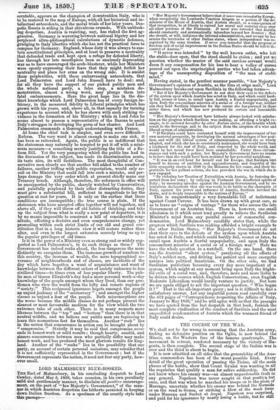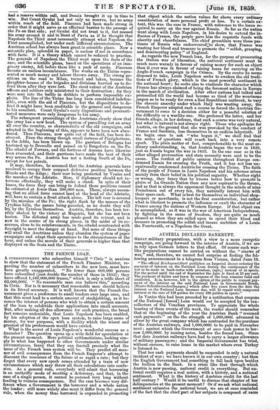THE COURSE OF THE WAR.
WE shall not be far wrong in assuming that the Austrian army, finding no defensive position on the Oglio, is now behind the Mincio, on the Western face of the famous quadrangle. The movement in retreat, rendered. necessary by the victory of Ma- genta, is then complete. The second stage of the Italian. war is over and the third is about to begin.
It is now admitted on all sides that the generalship of the Aus- trian commanders has been of the worst possible kind. Every detail of the great operation of passing the Ticino, all the main phases of the battle, show that Count Gyulai was wanting in all the requisites that qualify a man for active soldiership. .He did not know where his enemy was—an almost unpardonable fault in any general. Napoleon was never caught in that positicn but once, and that was when he marched his troops on to the plain of
Marengo, uncertain whether his enemy was behind the Bormida or on the road to Genoa, or striking a blow at the weak force under Massena and Sachet at Aoqui. Napoleon was surprised, and paid for his ignorance by nearly losing a battle, but he still
had a reserve within call, and Desaix brought it up in time to win. But Count Gyulai had not only no reserve, but no army
within reach of the field. Piacenza had been made strong in order that it might serve as an effectual barrier to the passage of the Po on that side ; yet Gynlai did not trust to it, but massed his army around it and in front of Pavia as if he thought that Napoleon the Third must necessarily attempt what Napoleon the First accomplished, but under such different circumstances. The Austrian school has always been great in scientific plans. Now a scientific plan, splendid on paper, is useless if not in accordance with facts. It is a theory which cannot be reduced to practice. The generals of Napoleon the Third went upon the facts of the case, and the scientific plans, based on the operations of an ima- ginary enemy, fell before them like a pack of cards. Piacenza became an useless incumbrance. The works on the Ticino repre- sented so much money and labour thrown away. The strong po- sitions on the road to Milan, turned and taken, became the slaughter-houses of the brigades and divisions hurried up to de- fend them after they were lost. The stout valour of the Austrian officers and soldiers only ministered to their destruction ; for they were sent into the battle in driblets to perform impossible ex- ploits. The line of the Ticino has long been considered indefen- sible, even with the aid of Piacenza, but the dispositions to de- fend it might have been creditable io the general and dangerous to his assailant. Count Gyulai's early dispositions and procrasti- nated measures were only dangerous to his army.
The subsequent proceedings of the Austrians clearly show that the army has a new head. The system of parcelling out an army all over the country, so characteristic of the old campaigns, and adopted in the beginning of this, appears to have been now aban- doned. Thus Piacenza, now quite out of the field, has been de- stroyed. Even the strong though small fortress of Pizzighettone, on the Adda, has been blown up. The garrison of Bologna has hastened up to Brescello and passed on to Borgoforte on the Po. The citadel of Ferrara and the fortress of Ancona have likewise been evacuated, and their garrisons have made the best of their way across the Po. Austria has not a footing South of the Po, except for her patrols. It may, therefore, be assumed that the Austrian generals have resolved to occupy their compact defensive position between the Mincio and the Adige ; their rear being protected by Venice and the marshes of the Adriatic. Here, if diplomacy should not in- tervene effectually,' they will make a stand. In spite of their losses, the force they can bring to defend these positions cannot be estimated at fewer than 200,000 men. These, always assum- ing that an allied force cannot land at the head of the Adriatic, will have.to sustain a front attack alone. The left rear is covered by the arches of the Po; the right flank by the masses of the TyrAese hills, the passes being guarded, as no doubt they will be4 by the Tyrolese themselves. Austria, therefore, has been ter- ribly shaken by the victory at Magenta, but she has not been beaten. The defeated army has made good its retreat, and is now in the centre of its strong places, in the midst of its re- sources, close to its reinforcements, in the citadel oonstructed with foresight to meet the danger at hand. But none of these things will avail the Austrians unless they abandon the system of paper campaigns and adapt their operations to the circumstances of the hour, and unless the morale of their generals is higher than that displayed on the Sesia and the Ticino.



































 Previous page
Previous page